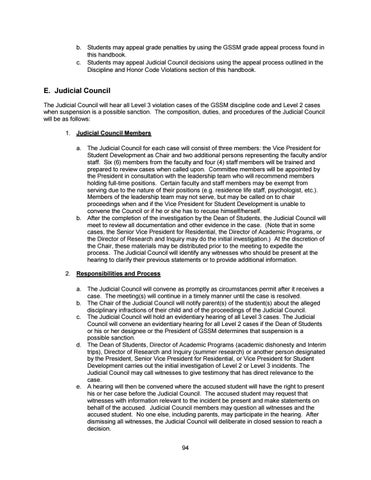b. Students may appeal grade penalties by using the GSSM grade appeal process found in this handbook. c. Students may appeal Judicial Council decisions using the appeal process outlined in the Discipline and Honor Code Violations section of this handbook.
E. Judicial Council The Judicial Council will hear all Level 3 violation cases of the GSSM discipline code and Level 2 cases when suspension is a possible sanction. The composition, duties, and procedures of the Judicial Council will be as follows: 1. Judicial Council Members a. The Judicial Council for each case will consist of three members: the Vice President for Student Development as Chair and two additional persons representing the faculty and/or staff. Six (6) members from the faculty and four (4) staff members will be trained and prepared to review cases when called upon. Committee members will be appointed by the President in consultation with the leadership team who will recommend members holding full-time positions. Certain faculty and staff members may be exempt from serving due to the nature of their positions (e.g. residence life staff, psychologist, etc.). Members of the leadership team may not serve, but may be called on to chair proceedings when and if the Vice President for Student Development is unable to convene the Council or if he or she has to recuse himself/herself. b. After the completion of the investigation by the Dean of Students, the Judicial Council will meet to review all documentation and other evidence in the case. (Note that in some cases, the Senior Vice President for Residential, the Director of Academic Programs, or the Director of Research and Inquiry may do the initial investigation.) At the discretion of the Chair, these materials may be distributed prior to the meeting to expedite the process. The Judicial Council will identify any witnesses who should be present at the hearing to clarify their previous statements or to provide additional information. 2. Responsibilities and Process a. The Judicial Council will convene as promptly as circumstances permit after it receives a case. The meeting(s) will continue in a timely manner until the case is resolved. b. The Chair of the Judicial Council will notify parent(s) of the student(s) about the alleged disciplinary infractions of their child and of the proceedings of the Judicial Council. c. The Judicial Council will hold an evidentiary hearing of all Level 3 cases. The Judicial Council will convene an evidentiary hearing for all Level 2 cases if the Dean of Students or his or her designee or the President of GSSM determines that suspension is a possible sanction. d. The Dean of Students, Director of Academic Programs (academic dishonesty and Interim trips), Director of Research and Inquiry (summer research) or another person designated by the President, Senior Vice President for Residential, or Vice President for Student Development carries out the initial investigation of Level 2 or Level 3 incidents. The Judicial Council may call witnesses to give testimony that has direct relevance to the case. e. A hearing will then be convened where the accused student will have the right to present his or her case before the Judicial Council. The accused student may request that witnesses with information relevant to the incident be present and make statements on behalf of the accused. Judicial Council members may question all witnesses and the accused student. No one else, including parents, may participate in the hearing. After dismissing all witnesses, the Judicial Council will deliberate in closed session to reach a decision. 94


